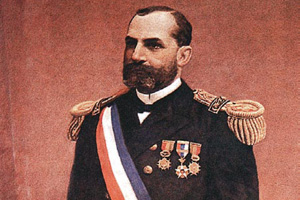Taking advantage of the fact that after the defeat of Athens in the Peloponnese War many Greek cities were embroiled in pointless conflicts, Phillip II of Macedonia set off to conquer Greece. He achieved his goal after winning the battle of Chaeronea in 338 B.C. and decided to conquer the Persian Empire, but he was assassinated by one of his officials. His son, Alexander the Great, barely 20 years old, succeeded him to the throne.
The hegemony left by Phillip II was in danger, but his first born son acted swiftly, summoning all of the Greeks in an assembly in Corinth. There, Alexander’s display of power, forced all present to recognize him as the commander of the league of Hellenic cities. All, except the Thebans, gave him complete obedience. Thus he ordered the destruction of Thebes but spared its temples and the poet Pindarus’ house. Having consolidated his power, Alexander the Great decided to embark upon one of the most ambitious projects of Ancient History: the conquest of the Persian Empire.
The March towards the East
After crossing the Hellespont with nearly thirty five thousand men, Alexander the Great obtained his first victory at the battle of the River Granicus in Phrigia in the spring of 334 B.C. He then made his way to Asia Minor, where he took control of Sardes, the coastal Greek cities (which were liberated from Persian tribute), and Anatolia. From there he crossed the Taurus and passed through the Cilician Gates in the northeast of Syria to confront Darius III in Issus in 333 B.C. Once again he was victorious, and the Persian King was forced to flee, but his family was captured. At that moment, Darius III offered Alexander a peace treaty, money for the rescue of his wife and children, and also one of his daughters as a wife. However the Macedonian king did not accept this offer. This was the beginning of the decline of the Persian Empire.
After this Alexander occupied Syria, all of the Phoenician Coast and conquered the city of Tyre. He then took over Egypt, which surrendered peacefully, and founded the city of Alexandria in the Nile Delta in 332 B.C. Immediately afterwards, he and his army made their way to Mesopotamia, where he once again confronted Darius III in Arbela, near the ruins of Nineveh. On this occasion the Persians had a great army made up of 45,000 horsemen, 200,000 infantry soldiers and 150 war chariots. Notwithstanding the enormous numerical superiority of the Persians Alexander triumphed in 331 B.C. As in Issus the King of Persia immediately had to flee.
Following this, Alexander took the city of Babylon. Afterwards he invaded Susa and Persepolis, which he torched. In these three cities he took control of the wealthy treasuries kept in each city by Darius III. He used these to continue financing his campaigns and continued advancing towards the Caspian Sea. He arrived in Ecbatana, where the King of Persia had taken refuge. However, shortly after, Darius III was assassinated by Bessus, an official in his army. This led Alexander to make his way to the eastern provinces of the Persian Empire, currently Uzbekistan and Afghanistan. In these areas he founded a number of cities with the name Alexandria.
The Expedition to India
In 327 B.C. Alexander the Great began his expedition to far away India. His first stop was in the Indus Valley, where, in a short time, together with his troops he faced and defeated King Porus and his army of elephants.
With his boundless ambition, he wanted to keep pressing forward, but his troops were tired and refused to continue. Alexander had to give in. He was forced to return to Babylon, but shortly after he became sick. He died at the age of 33, a victim of malaria (a disease transmitted by mosquito bites). His sudden death gave rise to problems with the succession to the throne, so the Regent Perdiccas, named by Alexander shortly before his death, assumed power until it could be decided who was the rightful heir to the throne. Philip Arrihidaeus, the illegitimate son of Philip II and Alexander IV and the posthumous son Alexander the Great had with his wife Roxanne, contested this position. Nevertheless, numerous succession struggles broke out, in which the wife and son of Alexander were killed and Philip Arrihidaeus decided to abandon the possibility of being king.
Eventually, Alexander’s Empire was divided among the generals, also called Diadochi, who formed four new kingdoms. Cassander kept Macedonia, Lysimachus kept Thrace, Seleucus kept Syria and Ptolemy kept Egypt. These states were later called Hellenistic Kingdoms, due to the fact that Alexander the Great had spread the Greek ideals in all of the lands he conquered.








